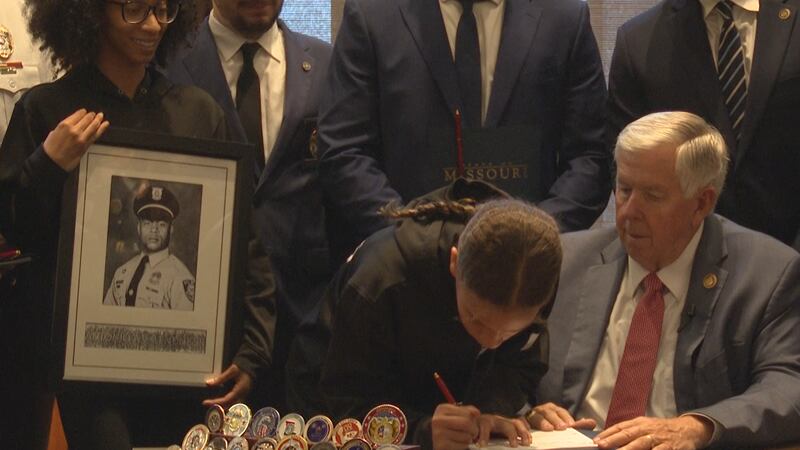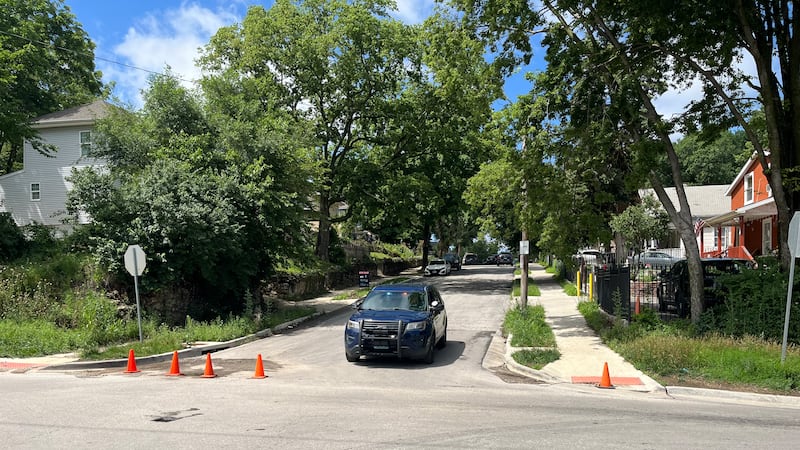‘Valentine’s Law’ set to take effect Wednesday, alongside ban on celebratory gunfire
SB-754 includes changes to inuring K9s, creates cyberstalking task force and removes some parole

ST. LOUIS, Mo. (First Alert 4) - Set to take effect on Wednesday, SB-754 will bring changes to public safety laws across Missouri -- including the enactment of “Valentine’s Law” and bans on celebratory gunfire in the state.
VALENTINE’S LAW
Valentine’s Law is named after a St. Louis County Police Detective, Tony Valentine, who died in a police chase back in 2021. Sponsor’s named the bill in his honor. It creates a law criminalizing the act of running from law enforcement in a vehicle.
Before this legislation there was no law in Missouri criminalizing fleeing from law enforcement, as First Alert 4 previously reported.
The offense is technically titled “aggravated fleeing a stop or detention of a motor vehicle.” Basically, if someone knows an officer is trying to pull them over -- and they instead drive off -- it is at minimum a Class D felony.
It can increase in level if someone is injured -- or is killed because of the person’s actions running from authorities.
The punishments include a prison sentence ranging from seven years to 30. Fines are noted around $10,000.
Under this new law, if the lights and sirens are on -- and the person should be able to see them -- suspects cannot use a defense that authorities are being unlawful in pulling them over.
The bill had bipartisan , it was signed by Gov. Mike Parson back in July.
As part of SB-754, it brings in a wave of changes to crime laws in Missouri.
BLAIR’S LAW/CELEBRATORY GUNFIRE
Another major part of this legislation is “Blair’s Law” -- which bans celebratory gunfire in some cases, following the death of a woman.
This law “that a person commits the offense of unlawful discharge of a firearm if he or she recklessly discharges a firearm within or into the limits of a municipality,” according to the Missouri Senate’s webpage on SB-754.
The first offense means a Class A misdemeanor, which elevates to a Class E Felony for the second -- and a higher felony for a third offense and above.
The bill summary specifically notes that the law applies if the unlawful discharge of the weapon was "with criminal negligence.”
“These provisions will not apply if the firearm is discharged under circumstances as provided in the act,” the webpage states.
OTHER NOTABLE CHANGES
SB-754 has a number of alterations to operations in Missouri involving crime.
MAX’S LAW
Another aspect is the enactment of Max’s Law, named after a police K9 that was killed in the line of duty. Before August of 2024, the act of assault on a law enforcement animal was a Class C misdemeanor in Missouri.
Bill information says that this legislation would turn assault into a misdemeanor if the animal is hurt but doesn’t require a vet visit. If the animal is seriously hurt and needs medical attention, it would become a felony -- elevating to a Class D felony if the assault results in the death of a law enforcement animal.
"Finally, this act adds that any dog that is owned by or in the service of a law enforcement agency and that bites or injures another animal or human is exempt from the penalties of the offense of animal abuse,” the webpage states.
CONVICTION REVIEW UNIT
The Missouri Office of Prosecution Services can establish a review unit to look into claims of innocence of any defendant -- including those who pled guilty to a charge.
An application process will be created, attorneys will be involved -- and after a review is completed the unit will give its findings to prosecuting attorneys or other agencies.
“Finally, any prosecuting or circuit attorney may also file a motion to vacate or set aside the judgment while a conviction review unit is completing a review pursuant to this act.”
CYBER CRIMES TASK FORCE
A new task force is also created by this new change -- the Stop Cyberstalking and Harassment Task Force. It’s focus is on making recommendations on what tools are necessary to stop cyberstalking/harassment as defined in the legislation.
It will take from all groups -- victims, authorities, victim advocates and forensics experts -- and submit a report to the Governor and General Assembly before the end of each year.
It’s set to expire in December 2026, but could be extended.
CRITICAL INCIDENT STRESS MANAGEMENT PROGRAM
Places 911 dispatchers, paramedics, emergency medical techs, volunteer/fulltime firefighters are all eligible to use services of the Department of Public Safety’s Critical Incident Stress Management Program.
Avery Martinez covers water, ag & the environment for First Alert 4. He is also a Report for America corps member. RFA places talented, emerging journalists in newsrooms to report on under-covered issues and communities. Report for America is an initiative of The GroundTruth Project, an award-winning nonprofit journalism organization dedicated to rebuilding journalism from the ground up.
Copyright 2024 KMOV. All rights reserved.















